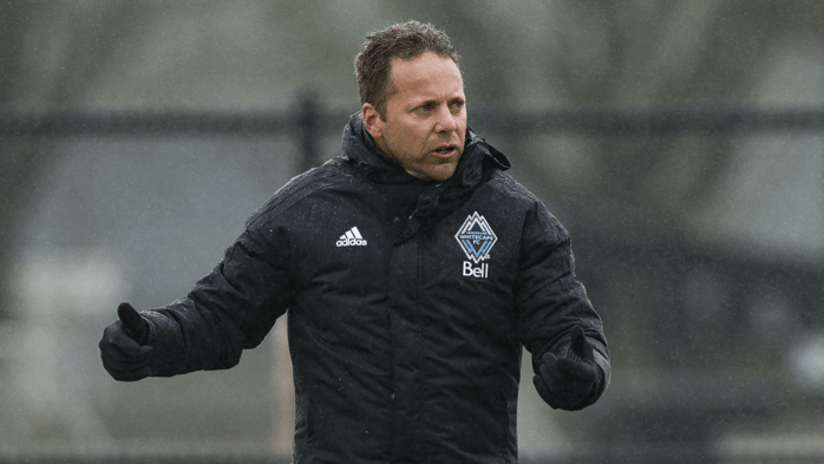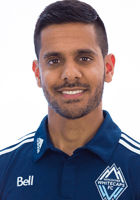VANCOUVER, BC – It’s been an offseason of change – or rather, complete transformation – for Vancouver Whitecaps FC, who open their 2019 MLS regular season on Saturday at BC Place.
The ‘Caps parted ways with 20 players over the last four months, setting the table for one of the biggest roster overhauls in Major League Soccer history. And it all started in November, when Whitecaps FC hired Marc Dos Santos as the club’s new head coach.
Dos Santos, a native of Montreal, Quebec, had previously been working as an assistant coach at LAFC under Bob Bradley. And that’s where Vancouver’s pursuit of Dos Santos began.
“We actually met with Bob Bradley years ago about the possibility of coming here,” said Whitecaps FC co-owner Jeff Mallett. “We have a relationship with him. LAFC and John Thorrington, a great ex-Whitecap, gave us permission to speak to Marc. But firstly Bob said, ‘I hand-picked Marc to come into my staff. He is one of the best of the best. I have so much respect for him. You may talk to him because he should be a first-team coach in Major League Soccer.’ That’s a big positive reference to have on your resume.”
So the ‘Caps spoke to Dos Santos – along with a group of other highly-qualified candidates. And then they spoke to him again. And again. They came away more impressed every single time.
“It was really clear he was highly prepared,” Mallett said. “It really felt like it was his moment.”
Dos Santos has dedicated the better part of his life to preparing for this moment.
He got his first head coaching job 12 years ago and has since made four championship final appearances, winning the 2009 USL First Division and 2017 NASL Soccer Bowl. Even before then, he had been learning from the likes of Jose Mourinho, José Guilherme Oliveira, and Vitor Frade – some of soccer’s most notable coaches and theorists – during his time in Portugal.
From them, Dos Santos was first exposed to the concept of “tactical periodization,” which suggests there are four key segments to a game: offensive organization, defensive organization, offensive transition, and defensive transition. Moreover, every aspect of a team’s preparation should revolve around those segments, and it should all be guided by a model of play.
This, perhaps above anything else, is a philosophy that has defined Dos Santos as a coach.
“It’s important that it’s a model of play that guides the club,” Dos Santos said in his introductory press conference. “A way of playing, a way of being, behaviours, principles. That should be the leader of the club. So if one day none of us are here, and new people are with the Vancouver Whitecaps, there’s an identity. If you’re in a plane and you’re looking down on a soccer field, and you see small dots, you say ‘Hey, that’s the Whitecaps playing.’ That’s the first thing I want to create here.”
So, naturally, establishing a model of play was the number one priority for Dos Santos, and that model of play has become evident through his interviews and actions over the last few months.
For starters, Dos Santos prefers a 4-3-3 formation with a single defensive midfielder. It’s the formation he used in all five of the club’s preseason matches. But a formation does not make a style of play. As Dos Santos has said, it’s more about the behaviours within the team and how all the players work together as a cohesive unit, which will remain consistent regardless of formation.
In simple terms, there are three key trademarks to Dos Santos’ system.
First, he likes a team that is comfortable in possession and not afraid to build out of the back. It’s part of the reason why someone like Jon Erice was brought in to play as a defensive midfielder. The 32-year-old Spaniard is not a destroyer by any means, but rather a player who is very technically and tactically astute, which should help the team in the first phase of build-up.
Secondly, Dos Santos has spoken a lot about having a team that is aggressive out of possession, which is where elements of a high-press come into play. When the team loses the ball, the idea is to win it back as quickly – and as high up the field – as possible.
This is a concept Dos Santos introduced to the team on the very first day of preseason. He said the ‘Caps won’t be a team that presses for 90 minutes, but one that follows certain cues to determine when and where they try to apply pressure on the opponent to regain possession, and when they decide to retreat into a defensive block.
It’s a system that places a great deal of demands on the players both physically and tactically and one that can take time to truly perfect. When done right, however, the rewards can be immense. And last year’s Napoli side that finished second in the Serie A, which Dos Santos has mentioned as an inspiration for this type of system, is a prime example.
Finally, Dos Santos said he wants his team to be “vertical” in attack. They won’t necessarily be a team that dwells on the ball, but rather one that is dynamic and aggressive going towards goal.
“I think that brings excitement to stadiums,” said Dos Santos, who has referenced his admiration for how Liverpool are able to play in such a manner.
When you put all of this together, it’s easy to see why Dos Santos and the ‘Caps have made the moves they have to complement a returning core that includes the likes of Yordy Reyna, Felipe, Russell Teibert, Doneil Henry, Jake Nerwinski, and Brett Levis.
On the back line, they’ve brought in centre backs like Derek Cornelius and Erik Godoy, who are comfortable on the ball and able to cover space in behind, which will be needed when the team presses high up the field. In midfield, they’ve brought in players like Erice and Inbeom Hwang, who are both technically gifted and good passers of the ball. And in attack, they’ve brought in players like Lass Bangoura and Lucas Venuto, who are very fast and direct going towards goal.
“At the top level, Marc said, ‘This is the type of system I’m going to play. These are the types of players I’m looking for,’” Mallett said. “When you see the recommendations that he brings forward on these signings, you can see how the puzzle fits together.”
“Now, we want a much more technical player,” he added. “We want a younger player, a player with a high football IQ, who really knows the game.”
In total, the ‘Caps have acquired 14 players since Dos Santos took over the head coaching gig, and quite remarkably, they hail from 12 different countries and six different continents.
“We always want to think outside the box,” Dos Santos said. “I think a lot of people go towards the same markets. We’ve seen a tendency that if a player from Peru does well, and I’m not targeting Peru it’s just an example, well many teams say, ‘Yeah, let’s go after players from Peru.’ And we saw tendencies like that. We wanted to focus on a model of play, a model of player, and go after the best players for that model regardless of where they’re from. We hope we’re going to be able to open new borders for MLS on some decisions we took.”
Now, with so many new players who come from different backgrounds, Dos Santos knows that it’s going to take some time to truly get this team firing on all cylinders. The fact that some of Vancouver’s biggest offseason additions, such as strikers Fredy Montero and Joaquin Ardaiz, only joined the group last week makes matters even more complicated. At the same time, Dos Santos said he doesn’t want to preach patience and set a low bar because he feels that will only create a “losing environment.”
“I don’t want to be in front of you guys and say, ‘Yeah, we need time,” he told reporters earlier this month. “You won’t have that from me. We want to arrive March 2nd ready to go, have a good product on the field, having our fans excited. The time that it’s going to take it’s going to take. But we hope that it comes together fast. That’s our objective and we’re working towards that.”
Mallett, for his part, said he didn’t want to ask for a “grace period” by any means, but added that the club has put a three-year plan in place following the transfer of Alphonso Davies to continue building this team into a championship contender.
“Really looking at each transfer window over this three-year period, how do we put ourselves in a position not just to get to the playoffs?” Mallett said. “As Marc said, he’s here for one thing. He wants to win championships. He’s done it before. He wants to do it, and we want to build every aspect of the club, to make sure that we get on the podium.”


